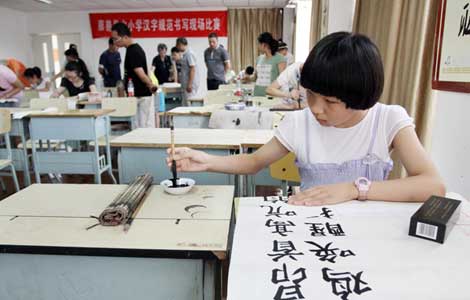Is it really possible to make people read books?
Updated: 2013-08-21 11:03
By Chris Davis (China Daily)
|
||||||||

Mark Twain once defined the classics as books that everyone wants to have read, but no one wants to read.
The Wall Street Journal reported recently that one of China's big policy makers - the General Administration of Press, Radio, Film and Television - was working on new regulations to address what may be perceived as a major irony: That even though China is one of the most prolific publishers of books in the world (not to mention that they are also the people who invented paper about 2,200 years ago), Chinese people aren't reading enough.
According to a survey conducted by the state-run Chinese Academy of Press and Publication - which licenses and distributes publications there - Chinese aged 18 to 70 read on average 6.7 books last year, a little more than one every two months. That's an increase of one book a year over the previous year, but apparently the higher-ups are looking to get people to read even more.
A 2012 Pew Research survey found that Americans' book-reading habits have been changing. No great surprise; nor is it that the oldest readers are the most avid. About one-third of the adults aged 18 and over surveyed said they had read one to five books in the previous year, 15 percent had read six to 10 books and a quarter had read 11 to 50 books over the previous 12 months. Five percent said they had read more than 50 books, which proves that book worms - or exaggerators - are still among us.
Fewer Americans are reading books now than in 1978, but it has not been a steady decline. A series of five Gallup surveys between then and 2005 found that a surprising 23 percent of full-time workers say they never do any reading related to work or school (emphasis added by the study).
Factoring in non-readers, the Pew 2012 numbers show that Americans on average read 10.5 books a year, or about two-thirds of a book a month, with readers over age 65 averaging about two books a month. That prompted someone named Ayden to comment on the Wall Street Journal's blog: "I'm amazed that Americans read that many books a year. Are they counting graphic novels and porn?"
The Chinese academy also keeps track of, among other things, the number of books and periodicals published in China each year. In 2012, according to its most recent figures, 414,000 books, 9,867 periodicals and 1,919 newspapers were printed for 172,633 outlets, bringing in 1.03 trillion yuan in revenues and exports amounting to $72,825,800. So the drop off in the reading rate is not for lack of reading materials.
The academy's data also show total print runs of 307.4 billion (the equivalent, it says, of 7.1 million tons of paper, but a paper consumption drop of 0.79 percent over the previous year). Of that, the lion's share - about 78 percent - is used by newspapers and journals and about 22 percent for books and textbooks.
Trade book sales in the US for 2012 rose 6.9 percent to $15 billion, according to figures compiled by BookStats, the Association of American Publishers/Book Industry Study Group statistics program. Here the impact of e-book purchases is being felt, with digital book sales up 44.2 percent in 2012 to $3 billion, accounting for 20 percent of trade revenue for the year. It is not clear from the Chinese academy's data what kind of an impact digital books are having.
Americans told Pew researchers they read for a variety of reasons: 80 percent 16 and older said "for pleasure", 78 percent said "to keep up with current events" and 74 percent "to do research on specific topics that interest them".
Last week the Shanghai Book Fair opened despite the brutal heat wave that pestered the region and fair organizers did everything they could to keep visitors as comfortable as possible, including installing spray-cooling facilities in front of the center to cool people down and extending hours into the evening to let people come when the sun was down.
The fair also dispensed with opening ceremonies to focus "efforts and resources on serving readers and colleagues in the publishing sector" and provided full-coverage Wi-Fi connection and 10 mobile equipment charging stations.
"Readers often use their mobile phones to scan the bar code of a book," said one editor at the fair, adding that books were being sold at a 20 percent discount.
It will be interesting to see if the draft regulations aimed at encouraging people to read more in China have any effect. If they do, I'll be the first to try them on my 16-year-old son.
Contact the writer at chrisdavis@chinadailyusa.com
(China Daily USA 08/21/2013 page2)

 Merkel makes historic visit to Nazis' Dachau camp
Merkel makes historic visit to Nazis' Dachau camp
 Chinese fleet sets sail for joint drills
Chinese fleet sets sail for joint drills
 President Xi meets WHO director-general
President Xi meets WHO director-general
 Everyman movie star
Everyman movie star
 Rural boarding schools need dorm managers
Rural boarding schools need dorm managers
 Center of hope and support
Center of hope and support
 Chinese characters under threat in digital age
Chinese characters under threat in digital age
 US, China to expand military exchanges
US, China to expand military exchanges
Most Viewed
Editor's Picks

|

|

|

|

|

|
Today's Top News
China asked to help in African mining
Dispute slows positive trend on Korean Peninsula
Expanded Sino-US exchanges to stabilize ties
Chinese fleet sets sail for joint drills
Premier Li stresses need for reform
Children with HIV live in fear
Kidney trafficking operation smashed
Food safety tops public's concerns
US Weekly

|

|







